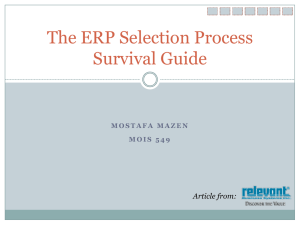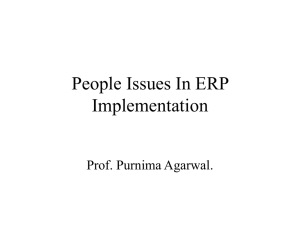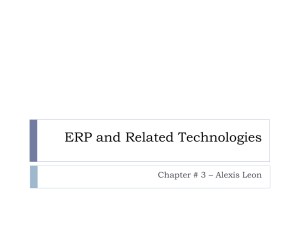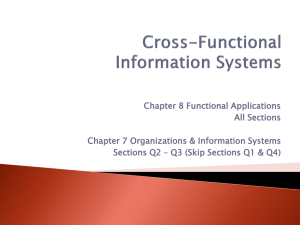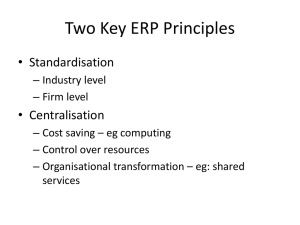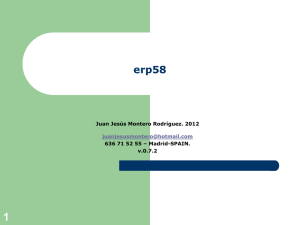ERP Implementation Phases
advertisement
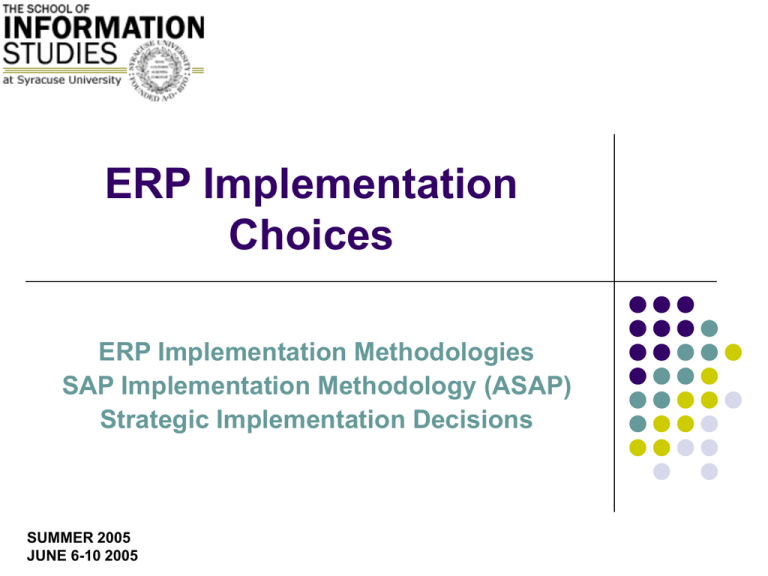
ERP Implementation Choices ERP Implementation Methodologies SAP Implementation Methodology (ASAP) Strategic Implementation Decisions SUMMER 2005 JUNE 6-10 2005 ERP Implementation Choices ERP Implementation Methodologies SAP Implementation Methodology (ASAP) Strategic Implementation Decisions SUMMER 2005 JUNE 6-10 2005 ERP Implementation Phases Can be used for any ERP implementation Based on Project Management Methodology Project Initiation Planning Controlling Execution Closeout IST 600 ERP Systems: Key Implementation Issues U. Yeliz Eseryel ERP Implementation Phases According to Ross: Design Implementation Stabilization Continuous Improvement Transformation IST 600 ERP Systems: Key Implementation Issues Markus and Tanis: Chartering Project Shakedown Onward and Upward U. Yeliz Eseryel ERP Implementation Choices ERP Implementation Methodologies SAP Implementation Methodology (ASAP) Strategic Implementation Decisions SUMMER 2005 JUNE 6-10 2005 SAP Implementation Timeline Accelerated SAP (ASAP) Implementation Methodology IST 600 ERP Systems: Key Implementation Issues U. Yeliz Eseryel What is ASAP Methodology? IST 600 ERP Systems: Key Implementation Issues U. Yeliz Eseryel Project Success With ASAP Meth. IST 600 ERP Systems: Key Implementation Issues U. Yeliz Eseryel Phase-1 Project Preparation IST 600 ERP Systems: Key Implementation Issues U. Yeliz Eseryel Phase- 2 Business Blueprint IST 600 ERP Systems: Key Implementation Issues U. Yeliz Eseryel Phase-3 Realization IST 600 ERP Systems: Key Implementation Issues U. Yeliz Eseryel Project Plan Outline for Realization IST 600 ERP Systems: Key Implementation Issues U. Yeliz Eseryel Phase-4 Final Preparation IST 600 ERP Systems: Key Implementation Issues U. Yeliz Eseryel Phase-5 Go Live & Support IST 600 ERP Systems: Key Implementation Issues U. Yeliz Eseryel ERP Implementation Choices ERP Implementation Methodologies SAP Implementation Methodology (ASAP) Strategic Implementation Decisions SUMMER 2005 JUNE 6-10 2005 Strategic ERP Implementation Choices Timeline Staff/Resources Big Bang Implementation Pro’s and Con’s? Phased (Roll Out) Implementation Mini Big Bang (Combination of big bang and roll-out) Outsourcing In-house Pro’s and Con’s? Customization Level IST 600 ERP Systems: Key Implementation Issues Pro’s and Con’s? U. Yeliz Eseryel Customization in ERP Environment Technical Customization Process Customization IST 600 ERP Systems: Key Implementation Issues U. Yeliz Eseryel ERP Technical Customization Davenport: Module Selection Table Configuration Code Modification Brehm, et.al. : IST 600 ERP Systems: Key Implementation Issues Configuration Bolt-on’s Screen masks (eg: 3 screens into 1) Extended Reporting Workflow Programming User Exits ERP Programming (eg: ABAP/4) Interface Development Package Code Modification U. Yeliz Eseryel Module Selection Implement one or more modules Default configuration of the vendor May be appropriate for small companies Rarely sufficient for many companies IST 600 ERP Systems: Key Implementation Issues U. Yeliz Eseryel Configuration Configuration: Changing parameters in tables in SAP R/3 SAP promises that configuration specifications will transfer without problems to later versions of their software SAP calls configuration customization IST 600 ERP Systems: Key Implementation Issues U. Yeliz Eseryel Configuration in SAP R/3: SPRO IST 600 ERP Systems: Key Implementation Issues U. Yeliz Eseryel The Implementation Guide (IMG) IST 600 ERP Systems: Key Implementation Issues U. Yeliz Eseryel Defining Companies IST 600 ERP Systems: Key Implementation Issues U. Yeliz Eseryel Code Modification (Customization) Customization: Changing code in SAP R/3. Today such changes are done in a programming language developed by SAP called ABAP/4. (In future it will also be possible in J2EE.) May involve defining new database tables It is possible to make changes to the code that SAP will not support. Future upgrades will need to be re-customized (expensive). IST 600 ERP Systems: Key Implementation Issues U. Yeliz Eseryel Process Customization Process Customization: The degree to which the business process is changed to fit the system. Business process: Tasks Resources Outcome Relationships among tasks Relationships among resources and tasks IST 600 ERP Systems: Key Implementation Issues U. Yeliz Eseryel Process Customization Categories No change Change in tasks and resources No changes in relationships among task and configuration of resources Eg: Task automation Incremental change Improvements in tasks and resources Improvements in relationships among tasks Improvements in relationships among tasks and resources. Nature of process and outcome measures unchanged Eg: Total Quality Management (TQM) IST 600 ERP Systems: Key Implementation Issues U. Yeliz Eseryel Process Customization Categories Radical Change Fundamental rethinking and radical redesign of elements in a business process including measures of performance Eg: Business Process Reengineering Eg: Move from functional view of organizations to process view of orgs. IST 600 ERP Systems: Key Implementation Issues U. Yeliz Eseryel ERP Customization Choices IST 600 ERP Systems: Key Implementation Issues U. Yeliz Eseryel Questions? IST 600 ERP Systems: Key Implementation Issues U. Yeliz Eseryel Sources Kenny Leung- SAP Summit 2005 Hong Kong Luo, W., & Strong, D. M. (2004). A framework for evaluating erp implementation choices. IEEE Transactions on Engineering Management, 51(3), 322-333. Brehm, Heinzl, and Markus, “Tailoring ERP Systems: A Spectrum of Choices”, 2000 IST 600 ERP Systems: Key Implementation Issues U. Yeliz Eseryel Some Terminology Basis Software. The R/3 Basis is similar to an operating system that specifically has the capability of processing any of the SAP R/3 transactions. It’s a middleware between the operating system and the servers that allow for smooth operations across different servers, operating systems, and databases. ABAP: Advanced Business Application Programming (ABAP/4), is a special-purpose, fourth generation language developed by SAP, is used to write programs for the specialized requirements of creating custom reports, screens, user-defined functions, and special industry solutions for use with the SAP R/3 System. IST 600 ERP Systems: Key Implementation Issues U. Yeliz Eseryel What is SAP Netweaver? A comprehensive integration and application platform, SAP NetWeaver works with your existing IT infrastructure to enable and manage change. SAP NetWeaver embraces Internet standards such as HTTP, XML, and Web services. Ensuring openness and interoperability with Microsoft .NET and Java 2 Platform Enterprise Edition (J2EE) environments such as IBM WebSphere. IST 600 ERP Systems: Key Implementation Issues U. Yeliz Eseryel
